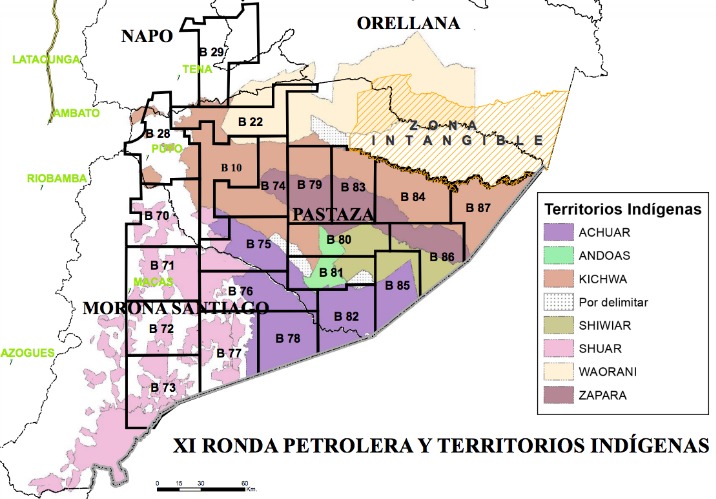Ecuador Signs Contracts for Two Oil Blocks in the Amazon to Chinese Oil Giant
Sápara elected leader, Manari Ushigua, speaking at a press conference in Quito, Ecuador.
On January 26 the government of Ecuador formally signed exploration contracts for two Amazonian oil blocks—known as blocks 79 and 83—with Chinese state oil company, Andes Petroleum. The Ecuadorian government also announced plans to open up 16 other oil blocks in its South-Central Amazon region to bids later this year.
The indigenous people in this region are strongly opposed to any plans for oil development and vow to resist and stop these projects. They know the environmental and social disaster that oil development will bring.
Donate now to support indigenous communities as they defend their rainforest home
For two decades, Pachamama Alliance has worked in solidarity with the indigenous organizations of Ecuador’s South-Central Amazon region to defend their rights and their territorial homes: the Achuar, Shuar, Kichwa, Sápara, and Shiwiar. Over eight million acres of pristine tropical rainforest have been protected from oil development.
In late 2013, oil development rights to nearly 100% of this territory were offered at auction to oil companies. The auction attracted very little interest from the oil industry, however at that time Andes Petroleum placed a bid on blocks 79 & 83. The recent signing of a formal contract for these blocks represents a next step in what can be a lengthy oil development process, especially when oil prices are at historic lows. However, in this case the government is clearly attempting to accelerate the process.
As you can see from the map below, the areas making up blocks 79 and 83 are home to both Kichwa—including the community of Sarayaku—and Sápara people. There are also two indigenous groups, the Tagaeri and Taromenane, living in voluntary isolation in the area comprising block 83. Ecuador’s Constitution declares the territories of such people off-limits to development.
Map of Indigenous Territories and Oil Blocks and South-Central Ecuador

Both international and Ecuadorian law recognize that indigenous and tribal peoples have the right to a process of prior, informed consultation about major projects in their territories. The process must be conducted in a culturally appropriate manner and be designed to achieve consent. The Ecuadorian government claims to have properly consulted the Sápara, however, members of the Sápara community, including the Sápara's elected leader, Manari Ushigua, assert that this consultation was made with false representatives of the community, not in accordance with the law, and they reject the legitimacy of the process.
The Ecuadorian government has conducted a process of dividing the indigenous communities and setting up compliant and non-representative alternative leadership councils. Instead of a culturally appropriate process to achieve consent, the government has created divisions and stirred conflicts in the indigenous communities in violation of rights clearly established by the Inter American Court of Human Rights.
Indigenous leaders from the Sápara and from Sarayaku participated at the UN climate conference in Paris. Thus they are fully informed about global commitments to move beyond fossil fuels toward a renewable energy economy and about the global discussions of how important it is to protect rainforests. This knowledge has reinforced their opposition to the government’s plans in blocks 79 & 83. To them it is now clearer than ever that oil development should not happen in a pristine tropical rainforest. It’s where oil must be left in the ground.
On January 28, the leaders of different indigenous nationalities directly affected by the contract between Ecuador and Andes Petroleum held a press conference in Quito to publicly announce their position that the government’s process of consultation has been illegal and illegitimate and that they reject the plans for oil exploration and exploitation in blocks 79 and 83 and reject plans for additional oil development in the South-Central region.
[metaslider id=46538]
Pachamama Alliance team members have been on the ground providing support to the indigenous people of the region as they organize to defend their territories.
It is vitally important at this time that the indigenous people have support so that they can make their voices heard and their firm opposition known, by Andes Petroleum and the Ecuadorian government, and also by other oil companies that might be considering participating in the next round of bids later this year. Right now the indigenous people need legal support and the ability to travel, and convene and organize quickly throughout their territories.
Thanks to our generous donors, we have been able to provide this kind of support in the past and we will be able to continue providing support where it is needed most at this crucial time.
Your donation today will ensure that indigenous federations have the support needed to be able to make informed decisions about protecting their rainforest homes.